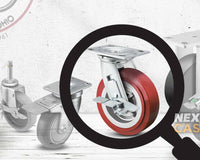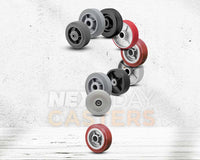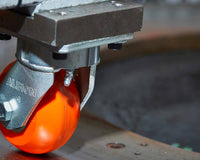The right wheel is critical to your mobility performance, longevity, and budget. So which wheel is right for you?
Typically the total working load capacity of your product will be an important element to your wheel selection. Each category of wheel has its pros and cons for load rating, price range, and performance–it really depends on what is most important for your business or project. Even though a wheel may seem more expensive now, the ergonomic or durability benefits may actually save you time and money into the future. For more information on load capacity requirements, please see our post on selecting the right caster, as this post is going to keep it focused on the wheels.
After you understand the capacity each caster will be required to support for your project, we encourage you to start with reviewing the flooring conditions your equipment will be regularly exposed to determine the best wheel family choice (detailed wheel information and pros/cons further described in this post). The main wheel families, quickly overviewed, are below:
- Polypropylene for the least expensive mobility: water resistant, lightweight, but noisy and not easy to roll on rough surfaces or over debris
- Rubber includes (TPR) for floor protection, vibration dampening, and noise reduction—step up to polyurethane for greater durability
- Xtra-Soft Rubber for ultimate floor and cargo protection, debris rejection, best-in-class shock absorption, and quiet mobility
- Polyurethane (includes TPU) for floor protection, greater durability, and chemical/oil resistance
- Phenolic for high load ratings, durability, and inexpensive mobility
- Metal for highest load ratings and shock and impact resistance
Now, let's discuss the pros and cons in a little more depth. We are always here to help should you want support, as there are many (and we many) types of wheels out there that are specifically designed to perform better in certain applications. We can help solve that with you should you be ready.
Polypropylene and Polyolefin Caster Wheels:
Polypropylene wheels are hard, non marking, injection molded plastic wheels. They provide for excellent service in wet and chemical applications at an economical price. Wheel hardness is at 70 (+/-5) Shore D scale; temperature range of -45° to 180°F.
Pros: inexpensive, lightweight, resistant to water and chemical/oils, non-marking
Cons: noisiest wheel option, does not reject debris, poor performance on non-smooth floors
Rubber Caster Wheels:
There are a few main categories of rubber caster wheels, but we are going to keep it to the most common forms sold on this store: TPR (thermoplastic rubber), performance TPEs, and rubber-on-iron.
TPR wheels are the most common for economical floor protection with a softer wheel, providing great protection and some shock absorption for quieter mobility. TPR wheels have for the most part replaced what was traditional hard and soft solid rubber wheels, as they are much more economical and perform better.
TPE wheels, including our proprietary Xtra-Soft Wheels, are an extremely advanced injection molded that has much better benefits than typical TPR wheels. These include the ability to reject debris (even metal shavings) which could slice into standard TPR wheels. They also provide much great shock absorption and floor protection, as well as longer lasting durability and higher load ratings–but are also a little more money than standard TPR.
Rubber-on-iron or mold-on rubber wheels are popular due to their softness and durable appearance. However, majority of them on the marketplace are extremely cheap and made out of reground materials that easily chunk and pick up debris. If you are experiencing that issue, we highly recommend upgrading to the Xtra-Soft wheels for a much longer last wheel that will not chunk and will not pick up the nails, screws, and debris that often causes loud and bumpy mobility and damaged paint lines and floors.
Wheel hardness is at 70 (+/-5) Shore A scale (65 Shore A for TPE); temperature range of -45° to 160°F or 180°F depending on selection.
Pros: floor and cargo protection, quite mobility, shock absorption, economical (TPR), non-marking, great weather-ability (except rubber-on-iron)
Cons: reduced load ratings vs. harder wheels, durability on rough concrete/surfaces (move to polyurethane if that is your surface), rubber-on-iron wheel treads can be cut by sharp debris
Polyurethane Caster Wheels:
Polyurethane provides high loads and long life for caster wheels. Beyond that, the roll-ability and floor protection are excellent. Polyurethane can be formed into solid polyurethane wheel, molded onto a metal (aluminum or iron) core, or injection molded around a plastic hub. Wheel hardness ranges depend on the specific polyurethane wheel, but are typically around 90-95 (+/-5) Shore A scale with a temperature range of -40° to 180°F.
Pros: excellent roll-ability and floor protection, high load capacities, improved ergonomics vs. comparable rubber wheels, resistant to chemical/oils, non-marking, ability to formulate for ergonomics, debris rejection, or capacity
Cons: can be expensive, potential tread separation in wet environments, temperature limitations vs. metal wheels
MAX-Efficiency Wheels are specifically designed, constructed, and formulated to outperform the competition in both ergonomics and longevity–delivering maximum efficiency for your operations. This wheel has been tested and proven to outlast leading competitors, making it the ideal solution for industrial customers looking for lasting performance, floor protection, and quiet operation. All wheels feature industrial precision ball bearings (patented top hats), a proprietary 85A durometer polyurethane blend on a precision aluminum core capable of handling loads of up to 1,250 lbs. per caster.
Phenolic Caster Wheels:
Phenolic wheels are hard, non-marking, heavy duty wheels. They are constructed of cotton covered in phenolic resin. These wheels provide high capacity at a relatively low price, making them a long time popular industrial wheel choice. However, they are quite noisy, somewhat brittle and can absorb moisture over time. Wheel hardness is Rockwell 102 E; temperature range of -65° to 250°F (300°F intermittent).
Pros: inexpensive and heavy duty, excellent load carriers, impact resistant, great choice for relatively stationary heavy products
Cons: noisy when rolling due to hardness, does not reject debris, poor performance on non-smooth floors, can absorb water when outer shell is compromised
Metal Caster Wheels:
There are many types of metal wheels available, including cast iron, ductile, and forged steel. We will focus on cast iron here, as it is one of the most common metal wheel choices in the industry due to its economical price position and capacity capabilities (for heavier duty applications where heavy shock loading and durability is required, ductile and forged steel choices are recommended). For most applications, cast iron, sometimes referred to semi-steel wheels, offers high tensile strength and cost effective solution for high capacity applications. Wheels are made of hot cast iron and painted. Although incredibly strong, they are noisy and can be brittle. Wheel hardness is Brinell 145; temperatures up to 800°F (consult us for any high temperature project to ensure proper grease and seals are present).
Pros: high capacity, durability, resistant to chemical/oils, high temperature ranges, cost effective for high capacities
Cons: noisy when rolling, does not reject debris, poor performance on non-smooth floors
For additional information on wheel bearings, check out this post. Please contact us with any questions, we are here to help!





